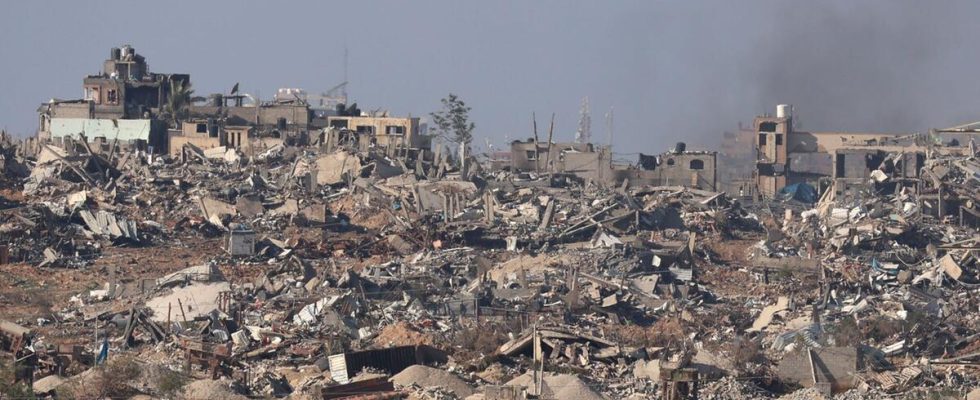War in the Middle East
Updated on January 5, 2024, 11:12 p.m
There has been war between Israel and the Islamist Hamas in the Gaza Strip for almost three months.
© dpa / Gil Cohen Magen/XinHua/dpa
What will become of the Gaza Strip after the war? This is being discussed in Israel’s government. For civilians, there is still no end to the suffering in sight – on the contrary. Meanwhile, threats are being made towards Israel again. The day at a glance.
While Israel’s army continues the war in the Gaza Strip and aid organizations complain about inadequate supplies for civilians, the government is discussing the future of the bombed-out coastal area. Defense Minister Joav Galant sees the Palestinians as responsible for the area after the end of the war.
The Prime Minister is also pushing for the situation on Israel’s border with Lebanon, where there are repeated violent confrontations with the Hezbollah militia
Doctors report horrific conditions in Gaza
Foreign aid organizations reported horrific conditions in the few hospitals still operating in the Gaza Strip. “We are seeing injuries caused predominantly by explosions and shrapnel,” Oxford University Hospital’s senior surgeon and clinical director of the emergency medical team, Nick Maynard, was quoted as saying in a statement by the New York-based private charity International Rescue Committee (IRC). .
“Many adults, children and babies are admitted with traumatic amputations of arms and legs. We have seen young children with the most horrific facial burns,” Maynard added.
The Israeli army’s fight against Hamas caused immense damage to residential buildings and civilian infrastructure such as hospitals. Shortly after Christmas, the World Health Organization (WHO) announced that only 13 of the original 36 hospitals were still partially functional. They are completely overcrowded and lack fuel, medicine, anesthetics, food and drinking water.
UN Emergency Relief Office: No access to northern Gaza for days
According to the UN emergency relief office OCHA, aid organizations have not been able to deliver urgently needed life-saving aid to northern Gaza for days. OCHA said the UN and its partners were unable to deliver humanitarian assistance north of the Wadi Gaza River for four days as access was delayed or denied and fighting continued in the area.
The urgently needed aid supplies also included medicine. There is a demand for safe and unhindered access to the areas north of Wadi Gaza, which have been cut off from the south for more than a month.
Most children in Gaza are inadequately fed
According to the UN Children’s Fund Unicef, the situation for minors in the Gaza Strip is also getting worse. According to a study at the end of December, 90 percent of all 1.1 million young people in the coastal strip were not receiving sufficient nutrients. The number of diarrheal illnesses has increased dramatically.
Eyewitnesses report heavy fighting in southern Gaza
Eyewitnesses in the southern Gaza Strip reported heavy fighting in the area of the city of Khan Yunis on Friday. A dpa employee reported that heavy explosions and shots could be heard constantly. Israeli troops would continue to advance into the Nuseirat, Bureij and Maghasi refugee camps.
Residents were said to be fleeing in donkey carts towards Rafah and other parts of Khan Yunis and Deir al-Balah, mainly to places designated by the Israeli army as safe areas. Food is scarce. Many people would only have precarious accommodation made of plastic sheeting.
Hezbollah chief announces reaction to Al-Aruri’s killing
After the killing of Hamas leader Saleh al-Aruri in Beirut, Hezbollah chief Hassan Nasrallah again announced retaliation. “The murder of Al-Aruri (…) will certainly not go without reaction and punishment,” said the general secretary of the pro-Iranian Shiite organization in a speech. Lebanon would be exposed if the killing went unanswered. Al-Aruri was killed on Tuesday in the Lebanese capital, allegedly by Israel.
His death had renewed fears that the Gaza war could also spread to Lebanon. Since the beginning of the Israeli offensive in the coastal strip, there have been almost daily confrontations between Israel’s army and Hezbollah, which is allied with Hamas, in the border region. The Israeli army attacked positions in southern Lebanon again on Friday.
According to its Secretary General, Hezbollah has carried out more than 670 missions in the border area with Israel since October 8th. Hezbollah chief Hassan Nasrallah said in a speech on Friday that these attacks had created a “balance of deterrence.”
Hamas leader: Israel is digging its own grave
According to the former chairman of the Islamist Hamas, Khaled Mashaal, Israel is “digging its own grave” with its war in the Gaza Strip. The terrorist organization distributed Mashaal’s speech on Thursday evening. The reason was the killing of the deputy head of Hamas’ political bureau on Tuesday evening in the Lebanese capital Beirut. Mashaal accused Israel of extending its “aggressions” abroad “because they think it will break resistance.”
“The enemy also believes that by assassinating leaders, resistance will be broken and leadership weakened,” the Hamas leader said. “It’s a big illusion.” Whenever a leader leaves, a new one will arise.
Hamas massacre: military defends investigation
After strong criticism from some right-wing extremist Israeli ministers, Israel’s army is defending a planned investigation into its own mistakes that made the Hamas massacre on October 7 possible. The military must learn from its mistakes, said spokesman Daniel Hagari.
The investigation has not yet begun, he emphasized. According to the information, this is an internal investigation in which former defense officials will also be involved. According to Hagari, the results of the processing should be made public. (dpa/cgo)

“This is how the editorial team works” informs you when and what we report on, how we deal with errors and where our content comes from. When reporting, we adhere to the guidelines of Journalism Trust Initiative.

